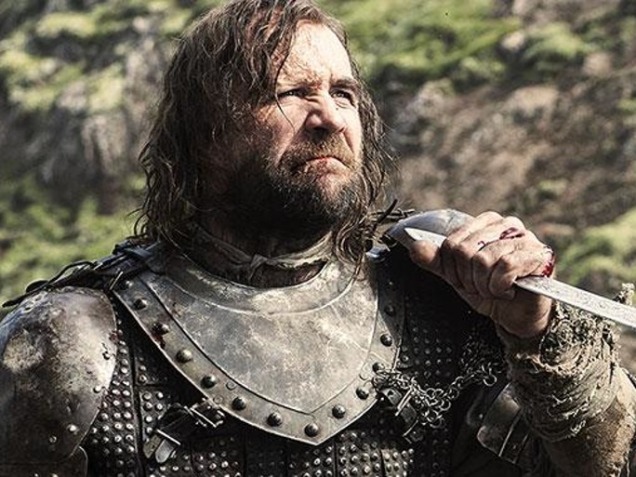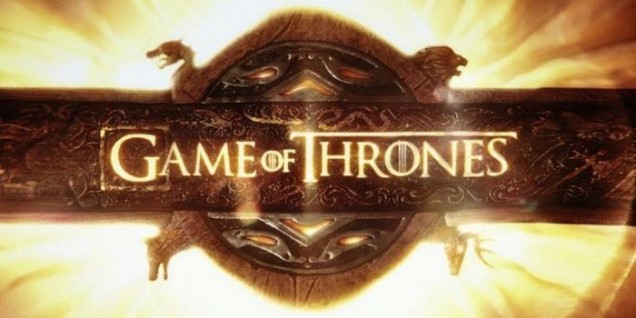
Warning: Here There Be Spoilers!
Episode 7 of Game of Thrones’ 6th series –entitled The Broken Man– saw the return of fan favourite/hated Sandor “The Hound’ Clegane (played excellently as always by Rory McCann). The Hound hadn’t been seen since the end of series 4, when he was left to die by Arya after his devastating duel with Brienne of Tarth . His ultimate fate was left up in the air (in the TV series, he very much died in the book), with many fans clamouring for his return. So, apropos of nothing, the Hound suddenly returns so late into series 6.
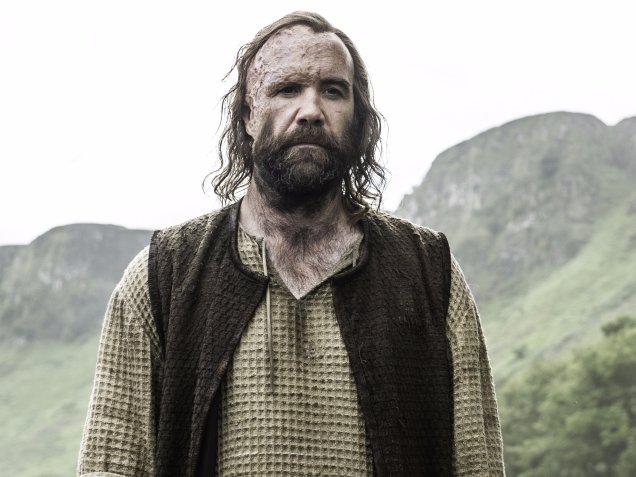
What is odd is how his reappearance both felt natural and jarring.
Natural, in that the story of him being rescued by Ian McShane’s Brother Ray (a huge waste of a great actor, especially since he doesn’t even utter the word cocksucker once!) & contemplating his own violent nature and the possibility of redemption. The form of the Hound’s arc is perfect for the character, in that he finds himself rescued by a man who shows him both respect & kindness –two things that have been utterly anathema to the Hounds existence– but finds himself drawn back to his inclinations towards killing. He is given a place in a religious community who both fear & accept him, he works labour which suits his temperament but he is ill at ease with a life of peace –acting like Damocles waiting for the sword to finally drop.
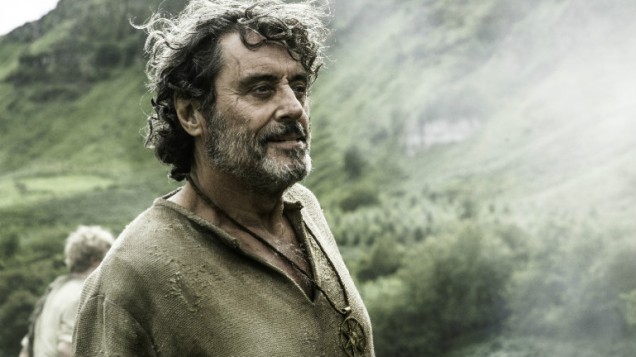
Yet it is a jarring return because it does not have a natural fit within the narrative.
Narratively it comes as a break in the current tension of the story. Beginning episode 7 in a way to purposely confuse the viewer, make them wonder why they are watching the scene of harmony & construction –two things that mesh against the usually themes of the show. Whilst the viewer has gotten to wonder about this tonal schism, they are shown the scarred form of the returned villain/anti-hero but not in any role or form they are used to.
This is an intentional jarring of expectations & visual setting yet it unfortunately breaks the established flow of the narrative.
It has no basic place within the current season’s arc; coming with the feel of being placed in as a breach to fit in other sudden shifts in the narrative direction.
Personal conjecture has it that since it showed the return of the Brotherhood Without Banners –who until this point had not been seen since the 3rd series– it is purposed to unite the Hound, Brienne (who is currently on her way to the Riverlands to recruit the Black Fish to fight for Sansa Stark) & Jamie Lannister in capture by the Brotherhood so Lady Stoneheart, née the resurrected Catelyn Stark, can have her revenge on all who betrayed her or served her enemies. Which is combining how characters are last seen within the books A Feast For Crows & A Dance of Dragons. This plays into bringing the Frays back into the fold & having Jamie, whose character arc was skewed with weird trips to Dorne & conflict with the High Sparrow, go to Riverrun to aid the Fray’s in their failed siege (which also brings the other fan favourite Bronn back to our screens),
In this writer’s very (very) unhumble opinion, bringing a character as looming in the minds of the television adaption as the Hound carries the odour of pandering.
Whilst it does fit that he could have survived his fight with Brienne and fall from the cliff, his arc should have been more naturally ended. Serving as a point of evolution of Arya as she chooses not to kill him because she both respected & hated him. This possible forced merging of divergent storylines & character arcs.
Yet the Hound is unneeded for such a resolution.
He has served his narrative purpose but his fate was left ambiguous. This meant that many fans & viewers could wedge their desires for his return into the conversations around the show. After the relatively poor reception of the 5th season, one could speculate that the show’s forerunners have been saving a return of such a divisive character within the fan community for a point that will garner maximum interest as the 6th series steams towards its conclusion. Thus making the Hound’s return both pandering & exploitative.
With the show’s forerunner recent announcing that they want to end the show in 2018 with the 8th series, possibly making seasons 7 & 8 shorter in the amount of episodes for each, one can see why they would be in a rush to draw in elements of the books (both written & forthcoming) to see the entirety of the story reach a satisfactory conclusion. Yet to bring in unnecessary threads, be in the return of the Hound or strange asides to fill in character happenings, chokes the already ongoing story as well as breaks the view of the narrative. Many viewers have complained on social media about how Arya’s arc with the Faceless Men drags on to nowhere –partly because of how different it is from the books but mainly because it feels boring in how its told– & this is something that could have easily been repaired if the showrunners had actually spent time on solidifying character arcs & the overall plot instead of shifting things to suddenly pander to viewers’ supposed expectation.
Which brings this writer onto what they consider the most extreme & vexing of Game of Thrones’ pandering: replacing proper storylines & scenes with pointless female nudity.
Cast your mind back to the events of episode 7. Do you remember the suddenly interlude with Yara & Theon Greyjoy as they with their band of reavers partied it up in what may have been Barvos (it was never made clear to this writer where they were). They were at a brothel, so naturally this meant there had to be lots & lots of naked women around & Yara had to be transformed into either bisexual or a lesbian (neither of which are an issue if they have always been a constant of the character before that moment).
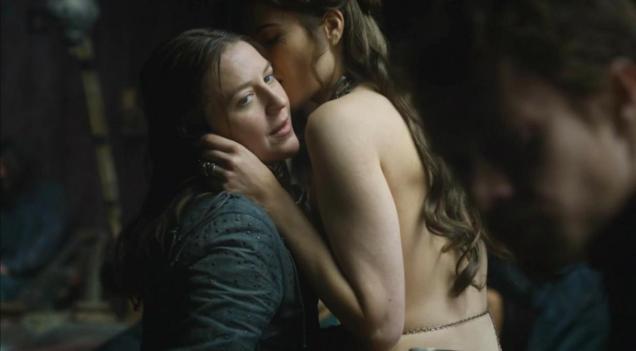
Now, do you recall what the scene was actually about? What purpose it had in the greater narrative scheme or even what Yara & Theon spoke about?
If not it was probably because you were distracted by Yara sucking on some whore’s tits.
Game of Thrones & HBO in general have built reputations for themselves as providers of adult content. Unfortunately, in the US ‘adult content’ tends to mean tits & violence.
Something that garnered Game of Thrones a lot of mainstream attention is that it did not shy away from either yet once that genie was released from the bottle, HBO could no longer tone it down. They had to keep pushing such angles because that is how they viewed audience expectations of the show –that they only watched it because titties would somehow be involved.
Now, this is not a prudish complaint.
There is nothing wrong with nudity in media but it has to serve a narrative point.
One can go on about how it can be seen as either empowerment & life saving or if it is entirely exploitative & vulgar yet that is not the crux of this writer’s vexation.
The issue at hand is how the insertion of scenes dedicated entirely to sex & nudity take away from important character scenes & story arcs. It is like the story is proceeding at an excellent pace, hitting all the right points for audience engagement, when it all screeches to a halt to grab our collective heads & say “hey look! Here some titties! Maybe some arse or bush! LOOK AT IT! LOOK AT MATURE WE ARE!!! All done? Good. Now back to the plot”.
This writer cannot be burdened by writing out every example in every episode & ever series yet the ones that stand out the greatest are Podrick’s visit to Little Finger’s brothel to lose his virginity as well as the pirate Salladhor Saan telling jokes in the bath to two prostitutes. Neither of these scenes served any narrative purpose. They were meant for ahem titillation & breaking of heavy tones that may or may not drag down an episode. Yet they have no function that could not have been fulfilled in other ways that did not have nudity as their centrepieces.
Yet this supposed obsession with associating nudity with maturity can only reach so far before it simply does become blatant pandering & exploitation of audience so socially starved of the normality of sex & nudity that they come to believe that any expression of it is a healthy taboo that one can indulge in with a sense of collective joyous guilt (which is also how shite like Fifty Shades of Grey become a brief zeitgeist but that’s an article for another day). One can endlessly argue that the over moralising of nudity & sex is something so profoundly toxic to social discourse that it overflows into & corrupts so many other aspects of society yet that wavers from this writer’s point.
The complaint remains that the majority of nudity within Games of Thrones is superfluous at best & distracting at worst.
It all remains within the contention that over pandering to fan demands/expectations can lead to a creative deathspiral for creative work because you, as a creative entity, are no longer controlling where your work goes but eternally responding to the whims of a vocal but very fickle few.
Maybe there will be a grand pay-off with the Hound’s return. Maybe it all threads together vital pieces of the story & direct us towards a glorious end. Yet his reappearance does not speak of confidence within the current format of the show. That the individual pieces have the strength to stand upon their merits & there is a wanting of faith in how both the season & show may conclude.
Yet this writer does find Rory McCann layered portrayal of the Hound enjoyable, given an emotional depth rare to how such a violent & unforgiving character is usually depicted upon our screens. So there is some measure of assurance that the Hound’s return is a portent for a strong series ending rather than a horrid death-flails of a program the showrunners & writers are losing faith in.
